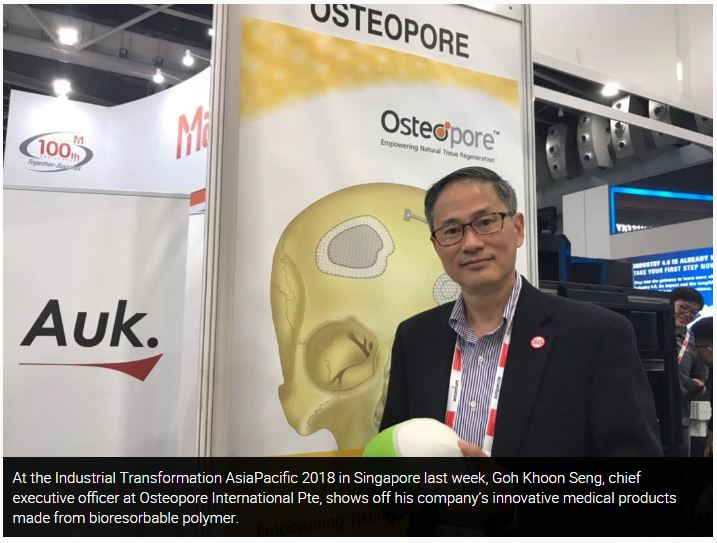Singapore on track to pursue industry 4.0 vision
SINGAPORE has been moving fast towards achieving industrial transformation by creating both soft and hardware infrastructures to support firms and workers to achieve industry 4.0.
While Thailand and many other countries have adopted an industry 4.0 policy to harness disruptive technologies that will advance their economies, Singapore has been doing it in a systematic way.
“Singapore has strong tri-party cooperation – government, business and trade unions,” said Koh Poh Koon, senior minister of state at Singapore’s Ministry of Trade and Industry.
The concerned parties have participated in extensive consultations on how to move the city-state economy up the value chain of global production, he said.
It is not just the technology and business strategy. Singapore also brings its workers along the industry 4.0 journey, Koon emphasised.
The government is building infrastructure and creating a business environment conducive for businesses to adapt themselves faster.
Usually, 20 per cent of leading corporates move fast on their own while 80 per cent may move at a slower speed, according to Singaporean officials.
Singapore last week launched the so-called Standards Mapping for Singapore Smart Industry Readiness Index. It aims to help businesses to identify relevant standards that can be used to upgrade their industry 4.0 capabilities. The index provides the manufacturing industry with good practices to address key requirements for interoperability, reliability, safety and cybersecurity.
To reskill and upskill workers, Koon said the government is working closely with trade unions.
The leaders of trade unions play a key role in encouraging workers to participate in upskill programmes or training for new jobs.
Singapore is encouraging firms to adopt automation and disruptive technologies by using a carrot-and-stick approach, such as offering grants for adopting new technologies but also imposing levies on firms using cheap labour from other countries, said Koon.
Some basic course training is free, some courses are co-funded by the government and firms which send their employees to attend.
One example is the model factory initiated by the Agency for Science, Technology and Research(A*Star).
The model factory provides a live production environment for companies to learn, experience, and experiment with advanced manufacturing, technologies, such as robotics and automation, manufacturing data analytics and business intelligence capacities, according to the agency.
Its virtual manufacturing lab uses virtual and augmented technologies which help small companies to try virtual factories or machine operations before they build or lease them. The virtual and augmented reality also provides a training course for workers.
Doing this helps firms save cost and choose the best machines suitable for their business or industries, according to Bertil Brandin, strategic development director at the A*Star.
The Singapore government has also long been working with multinational companies. For instance, last week it hosted the Industrial Transformation Asia-Pacific, a trade expo featuring the latest technologies from German and other multinational corporations.
Accenture, one of the global leading professional services companies participating in the expo, demonstrated the potential benefits of blockchain technology and how it could be applied to the shipping industry.
Currently, the company has built a consortium to push for application of blockchain technology in the shipping industry.
The technology is expected to allow concerned parties to track goods back to original producers, simplify data amendments according to the shipping process, streamline the checks required for cargo, and reduce the burden and risk of penalties for compliance levied on customers. It also eliminates a need for printed shipping documents, resulting in huge annual savings for the freight and logistics industry, according to Accenture.
Small and medium enterprises in Singapore have started to apply disruptive technologies such as 3D printing, Internet of Things, and robotics.
Goh Khoon Seng, chief executive officer at Osteopore International Pte, said his company employed 3D printing to customise for bone or skull implanting using bioresorbable polymer, which acts as a scaffold to allow natural tissue regeneration and this advanced material degrades itself. His products are also used for beauty surgery purposes.
He said his products had been approved by the Thai Food and Drug Administration.
Unlike Hong Kong where manufacturing sites have moved to mainland China, Singapore has maintained its manufacturing sector and systematically upgrades it.
It is because manufacturing is crucial for technology transfer and is a source of innovation, according to Singapore’s officials.
The sector contributed about 20 per cent of gross domestic product and generated 13 per cent of total employment in 2017.
Source: http://www.nationmultimedia.com/detail/Economy/30357021


 English
English




